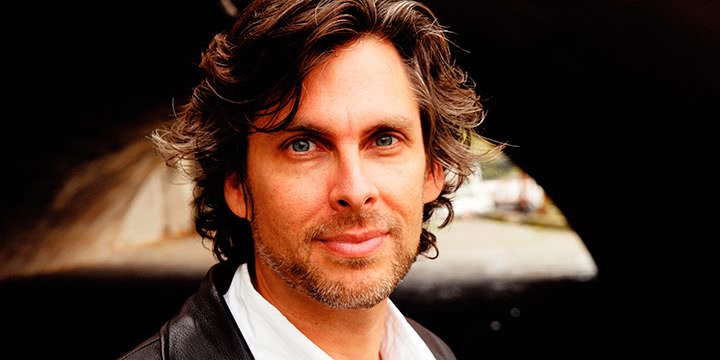If you’ve never readThe Amazing Adventures Of Kavalier & Clay, winner of the 2001 Pulitzer Prize, don’t worry; you’re still a good person, provided you’ve at least read Michael Chabon’s second novel,Wonder Boys. If you’ve never read that, then it’s a life half-lived and food likely turns to ash in your mouth.
Across eight books, Chabon has created some of the most vibrant and bewitching characters in contemporary fiction. Ahead of a Sydney appearance alongside his wife, Ayelet Waldman, Chabon talks about craft, habit, and who he wants to be when he grows up.
“It’s last Thursday here. Or maybe a distant Monday. I’m not sure. Richard Nixon is President, I know that much.”
He chuckles down the phone line. It is early evening for Chabon, and in just a few hours he will reach the appointed hour where he must force himself into a chair to start the evening’s work. For now, however, he is retracing the creative steps that led to the writer he is today, and just how much those early influences endure.
“Edgar Allan Poe is somebody I discovered around the age of 11, and became immediately convinced I was the reincarnation of. That was a delusion that lasted around three weeks, but I was very exorbitant about it while it lasted. But that’s a writer I go back to regularly and reread. Not just the favourites, but you always try to push yourself a little further, read the things that you couldn’t quite get into before. Arthur Conan Doyle is another. I’ll never lose my love and affection for the stories of Sherlock Holmes, but a few years ago I discovered his Brigadier Gerard stories, which I had known nothing about, and they’re just wonderful. So it’s not at all an exercise in nostalgia for me; I’m making new discoveries. I think that’s probably the hallmark of a writer. It might even be the definition of a writer – when you do go back to them, you find something new to appreciate in their work that you didn’t see before.”
It is certainly true of Chabon himself; a novel like The Yiddish Policemen’s Union offers fresh gems upon each reread, while every return to Wonder Boys is somehow unique. His writing schedule is itself an exhilarating practice (beginning each night at ten and working until three) and seems to contain the entire gamut of writing; the reluctance, the solitude, the hypnotic pleasure.
“Lately I’ve been pushing it even later, staying up closer to five o’clock a lot of mornings. The hours between ten and midnight might be spent in a kind of distracted way, although staying off the internet. The internet can’t be part of it, or else it will be all of it. But fooling around, rereading what I’ve done, maybe a little reluctant to get going. Then around midnight I’ll get rolling, but maybe a little slow. Around three is when it starts to feel it’s really running. A lot of times, around five in the morning, sometimes six, I will simply be too tired to keep going, even though I don’t want to stop because it’s going so incredibly well. I might be tired, but if I can just get to the end of this paragraph, to the end of this page, to the end of this chapter… and next thing I know it’s six-thirty and I force myself to stop.”
It’s splendid to imagine Chabon there, fingers whirring across the keys as the sun slips in, characters like Grady Tripp and Crabtree, Rosa Saks and Archy Stallings slowly taking shape. What elevates these characters to the ranks of real pretend-people, though, is Chabon’s grasp of balance. On their own, they may make curious character studies, but finding the story that lets them breathe is a delicate ask.
“I am absolutely certain that those two things, character and plot, are not exactly in opposition to each other, but it’s like a zero-sum game,” Chabon says. “The more you allow character to drive your narrative, the more that the writing itself is about character and examining what it is to be this particular human being, the less plot there can be. And the more plot that you have – by which I mean that chain of causal events that propels the narrative forward and keeps us reading – the less room there will be for character development. And those two things have to be held in tension with each other. You can’t betray your characters by having them do what they must do for the sake of the plot.
“I think for most novelists, especially mainstream novelists, you’re trying to find that sweet spot, that perfect point of tension where there is a sense of forward motion, and at the same time create characters who will move the reader and engage their emotions.
“But I don’t really think about [characters] afterwards. I will say, one of the books that has come closest is Kavalier & Clay. When I got to the end, and I knew I was writing the last few pages of the novel, I had the feeling of, ‘This is it. I’m not going to be this close to this book ever again,’ and had a certain wistful, valedictory sense of bidding the whole project farewell. Not just the characters, but the entire period of my life that it was contained within. I would like to write about the so-called Silver Age of comic books. But would I want that to be a direct sequel, about the same fictional characters 20 years later? For the most part, when a book is over, I can’t wait to move onto the next story. Who knows? Maybe someday.”
[Michael Cabon photo by Ulf Andersencourtesy of Getty Images]
Michael Chabon and Ayelet Waldman In Conversation takes place atSeymour CentreonTuesday November 3.



































